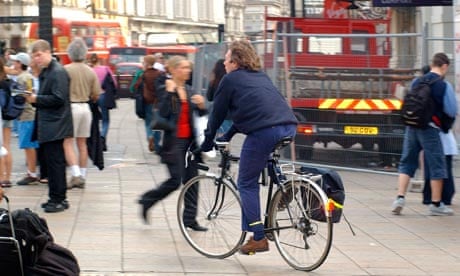The minister with responsibility for cycling, Robert Goodwill, has reiterated guidance on pavement cycling. It is against the law to cycle on the pavement and back in 1999 this was made a fixed penalty offence.
The original guidance was issued by Paul Boateng the minister responsible at the time. He said:
The introduction of the fixed penalty is not aimed at responsible cyclists who sometimes feel obliged to use the pavement out of fear of the traffic, and who show consideration to other pavement users.
Chief police officers, who are responsible for enforcement, acknowledge that many cyclists, particularly children and young people, are afraid to cycle on the road. Sensitivity and careful use of police discretion is required.
In a letter to cycle campaign Stop Killling Cyclists, Goodwill wrote:
Thank you for bringing the issue of cycling on the pavement around dangerous junctions such as Vauxhall Cross to my attention. I agree that the police should be using discretion in enforcing this law and would support Paul Boeteng's original guidance.
You may wish to write to Sir Hugh Orde, President of the Association of Chief Police Officers (Acpo), to bring this matter to his attention too.
This guidance represents an important clarification for cyclists across the country, and particularly those in London who have recently experienced what many have described as a heavy-handed approach by the Metropolitan Police.
In response to the horrific spate of cyclist deaths on the city's streets back in November last year the Met launched Operation Safeway. This has seen police officers monitoring traffic at major junctions.
In the eight weeks since its launch the police have handed out over 14,000 fixed penalty notices. Around 4,000 of these were to cyclists and about 1,200 were for cycling on the pavement. The penalty for this is £50.
Stop Killing Cyclists claims that this is a rate 35 times higher than for those issued to motor vehicles when mileage and numbers are taken into account. The campaign argues that if cyclists are faced with dangerous and badly design roads and junctions it is reasonable to mount the pavement on occasion providing care is taken not to endanger or alarm pedestrians.
Stop Killing Cyclists launched its direct action protest campaign in response to the fatalities in November with a die-in outside the Transport for London headquarters on 30 November, a demonstration that attracted well over 1,000 cyclists.
Following this a second die-in was organised in late December at Vauxhall Cross. The focus of this event was the question of pavement cycling. Campaigners explained that cyclists were forced from a safe segregated cycle path back onto the road just as they reach the busy turning onto the bridge.
Thanks to Operation Safeway those who chose to avoid this dangerous point in road by using the pavement found police officers waiting there to issue fixed penalty notices.

Following the minster's clarification campaign founder Donnachach McCarthy said:
Fining vulnerable cyclists for cycling responsibly on the pavement at extremely dangerous junctions like Vauxhall Cross, is a bedroom tax on two-wheels as there is no safe alternative for them to cycle on.
Since receiving the minister's letter, the campaign has contacted Orde and a meeting is being arranged to discuss this matter. In addition, Acpo have already sent the re-issued ministerial guidance to all local police forces across the country.
In a statement the activists said:
We are delighted that Acpo have acted so speedily in circulating the newly re-issued guidance on pavement cycling to all local police forces, following our request to them. Implemented properly this advice will save lives of vulnerable road-users at dangerous junctions, until such time as safe cycling infrastructure is installed.
The group is currently planning more activity including a major event later this year in Oxford Street.

Comments (…)
Sign in or create your Guardian account to join the discussion